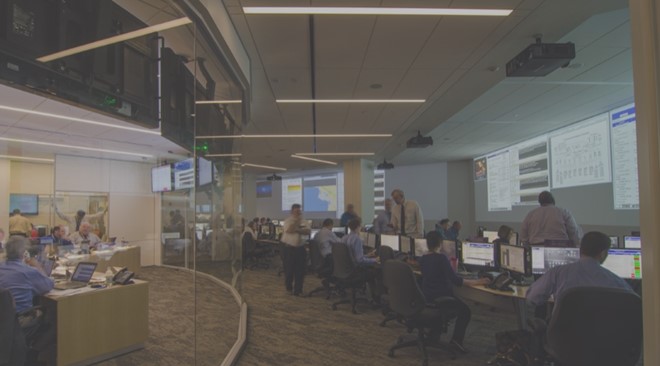Backgrounder on Incident Response
Printable Version
On this page
NRC Response to Emergency Events
Should there ever be a serious emergency at a U.S. commercial nuclear power plant or facility, the NRC is prepared to respond immediately. The agency’s headquarters Operations Center is staffed 24 hours a day with specially trained responders who monitor the activities of NRC licensees. They also are available to alert officials if the agency’s incident response resources are needed. In addition, the agency’s incident response policies, procedures and facilities are regularly tested with drills and exercises. The agency’s response program is then evaluated and updated as needed. The goal is to ensure the agency is ready to respond at all times.
If a significant incident occurs, the NRC activates its headquarters Operations Center and one or more of its four regional Incident Response Centers. Specially trained and qualified personnel are alerted to report to duty immediately.

Incident Response Program
The NRC incident response program uses a flexible, scalable system to tailor its response to the significance of an event. For example, depending on the type of event and its safety or security significance, the NRC might activate its response program. During activation, some NRC responders will work directly with the nuclear power plant or facility operators to independently assess the severity of the event, and some will evaluate licensee protective action recommendations. Other responders will liaison with the media, state and local governments, other federal agencies, Congress and the White House, and the international nuclear community.
Although the nuclear power plant or facility operator is responsible for returning the site to a safe condition, the NRC Chair has the authority to intervene. He or she can then direct the licensee’s on-site response if necessary.
The NRC tests itself many times each year with drills and exercises that mimic safety and/or security incidents. In addition to full-scale exercises, the Operations Center and Incident Response Centers are occasionally activated for small incidents or potential emergencies.

Licensee Response
NRC regulations require licensees to have plans for responding to incidents, mitigating their severity, and protecting against radiological releases. The NRC reviews and approves these plans, and regularly assess their adequacy and effectiveness through exercises.
If a significant incident occurs, licensees must take immediate actions to ensure safety and security. They must also provide timely notifications to the NRC and state and local government authorities, and make recommendations on how to protect the public from potential consequences.
Based on NRC regulations, licensees classify incidents according to the plant conditions and the level of risk to the public. Nuclear power plants, for example, use four emergency classifications:
-
Notification of Unusual Event – Events are in process or have occurred that indicate a potential decline in the level of safety of the plant. No release of radioactive material requiring offsite response or monitoring is expected at that time.
-
Alert – Events are in process or have occurred that involve an actual or potentially substantial decline in the level of plant safety. However, any release of radioactive material is expected to be only a fraction of the Environmental Protection Agency protective action guidelines.
-
Site Area Emergency – Events are happening or have occurred that involve an actual or potential major failure of the plant’s ability to protect the public. Any releases of radioactive material are not expected to exceed the EPA guidelines except near the site boundary.
-
General Emergency – Events are in progress that involve actual or imminent severe damage or melting of radioactive fuel in the reactor core. There is a potential for radioactive releases exceeding EPA guidelines beyond the immediate site area.

State and Local Government Response
State governments, and in some locations local and/or tribal governments, develop and implement emergency plans for NRC-licensed facilities. Although the licensee is responsible for what occurs onsite, state, local and tribal governments are responsible for protecting life, property, and the environment offsite.
Through drills and exercises, state, local and tribal governments work closely with the Federal Emergency Management Agency, and when appropriate, the NRC. The goal is to ensure that their plans and procedures will protect their community’s health and safety.
During an emergency, the NRC communicates directly with state, local and tribal governments to share information. The NRC may also offer technical advice and assistance if requested.

Federal Response
The NRC works within the National Response Framework to respond to events. The framework guides the nation in response to complex events of national significance that may involve a variety of agencies and hazards.
Under this framework, the NRC retains its independent authority and ability to respond to emergencies that involve NRC-licensed facilities or materials. The NRC coordinates the overall federal technical response to an incident that involves one of its licensees.
The NRC may ask for support from the Department of Homeland Security, which may lead and manage the overall federal response to an event. In this case, the NRC would remain the primary federal authority for onsite response and would perform an important role in providing technical expertise and helping share information among the various organizations and licensees.
March 2023

Page Last Reviewed/Updated Thursday, March 23, 2023